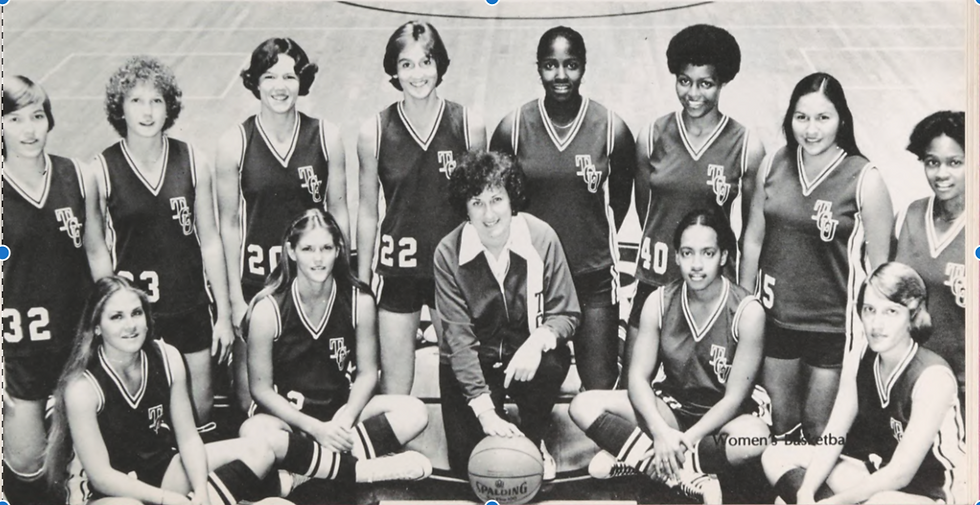"MINNIE" VERNELL ARMSTRONG
- WOC Feminisms

- Apr 9, 2019
- 3 min read
Introduction:
In the winter of 1892 at Smith college Netball which later became women's basketball emerged to help promote the health of college aged women. Sendra Berenson who was the instructor felt that some of the women could be at risk of a “nervous fatigue” because of the games strenuous nature. So in order to keep the game “acceptable” for the women to play the rules were modified. The court was divided into three areas and nine players per team. The ball was moved from section to section by passing or dribbling. Players were limited to three dribbles and could hold the ball for three seconds. No snatching or batting the ball away from a player was allowed. A center jump was required after each score. Peach baskets and the soccer ball were the equipment. Uniforms consisted of attire similar to school uniforms, including long baggy shorts. Throughout the 1970s, funding for (and interest in) women's basketball began to dramatically increase as schools receiving federal funding began to come into compliance with new laws mandating a lack of discrimination based on sex. TCU joined this bandwagon in 1977. The year after women's basketball premiered in the Olympics. Going into the depths of my research i found out that Vernell Armstrong was the First African American Women's basketball player at TCU and set records that are still holding strong today.

Notable Aspects:
Minnie “Vernell” Armstrong a native of Rocky Mountain, North Carolina began her basketball career at TCU in the winter of 1977 and from that moment on she made her mark on a program that has produced WNBA players and some of the best players in the nation. Even with the amount of changes on the rules, regulations and time constraints in the game of basketball from 1977 to now “Minnie” Vernell Armstrong's personal records still stand. Just weeks ago in February 2019 Amy Okonkwo moved passed Vernell’s record of 1,102 career points scored in a TCU jersey which put Vernell in 17th place in TCU’s history. But what is not noted in any of the records or notations of Vernell’s achievements is that she did this in 3 seasons and not the normal 4 that athletes play. Not only did Vernell help bring TCU women's basketball team to a winning record after a 5-18 start she helped coach the Men’s team , as well. In an article written in the TCU magazine in 1997 by Eugenia Trinkle titled We’ve Come Along Way she talks about how women's sports at TCU have come along way from where they started with the minimal programs and funding they received. Though Vernell was noted in many Daily skiffs for her accomplishments on the court her life after steering TCU to the program we have today her impact on TCU’s community stops at printing of her name in the Commencement Program.
Taking a Deeper Look:

“Minnie” Vernell Armstrong reminds me of the women in the Combahee River Collective and how they continued to make marks on society even when they did not have the platforms of others to showcase how much change they were truly making. In an excerpt from the Combahee River collective it states “ our politics initially sprang from the shared belief that Black women are inherently valuable, that our liberation is a necessity not as an adjunct to somebody else's may because of our need as human persons for autonomy” Her loving and selfless nature shows in how she helped not only her team succeed but helped coach the Men’s team with little to no recognition except for one line in an article written about how sports have come so far. This narrative of erasure is one that is told over and over in the Women of Color community because it is expected. Expected that their bodies be used for the greater good without the minimal of a notation that they did. Not only was Minnie Vernell Armstrong a trailblazer on the court she was one in the classroom. After transfering to TCU from the Army after completing her service to our country she graduated CUM LAUDE with a degree in Criminal Justice. In the many initiatives of Diversity, Equity and Inclusion TCU needs to notate the people who create the foundations of the university even if there contribution was not monetary.
Reflection:

Looking into "Minnie" Vernell Armstrong makes me thing about how many Women of Color at Universities across the globe are written over or written out of accomplishments because their seen as "unvaluable" or doing what they are supposed to be doing because their bodies are commodities. Commodifying women of color is something that has been taken place for centuries and I believe its stopping at this generation of researchers who are searching for the people who laid the foundations for their successes .
TCU & Web Mentions of Vernell Armstrong:
By: Ericka Davis









Comments